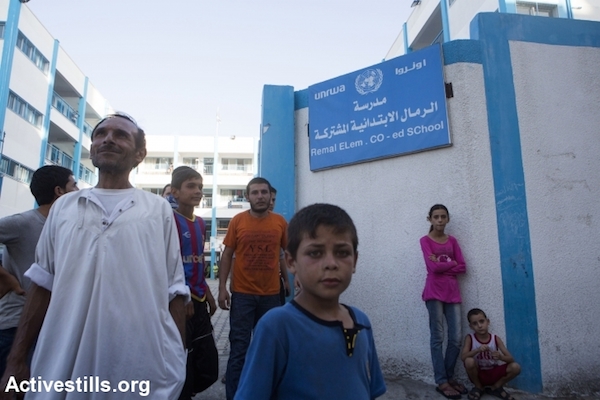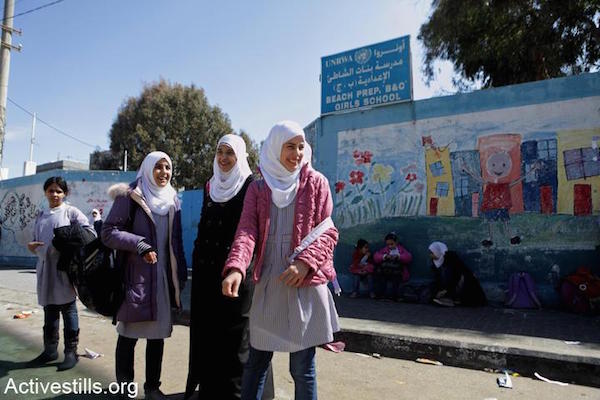A budget deficit of $101 million threatens to delay the start of the academic year in UNRWA schools. At a time of rising extremism, such an outcome could have consequences for states across the Middle East, the agency says.

UNRWA, the UN agency responsible for Palestinian refugees, is facing a budget deficit of $101 million for the coming year, the agency says. The shortfall threatens to delay the start of the academic year for UNRWA-run schools. At risk, too, are psychosocial support programs that are administered within UNRWA schools (those offered in health centers will continue to run).
The scale of the crisis is unprecedented and has the potential to affect enormous numbers of Palestinian refugees: 500,000 children and 22,000 teachers are supposed to be attending or instructing at over 600 UNRWA schools throughout Gaza, the West Bank, Syria, Lebanon and Jordan. Seven thousand youths at eight vocational training schools across the region also face the postponement of their academic year.
The current funding shortage is the worst UNRWA has faced in its 65 years of operations. However, raising sufficient finances is a perpetual struggle that has become increasingly difficult as the number of refugees continues to grow. (Unlike refugees elsewhere in the world under the career of UNHCR, Palestinian refugees under the care of UNRWA tend to pass on their refugee status through multiple generations. Uniquely, that means that the Palestinian refugee population has actually increased over time.)
The lack of money puts immense strain on UNRWA services across the Middle East, leaving the organization vulnerable to sudden drastic deteriorations — such as in Syria’s Yarmouk camp, which earlier this year saw UNRWA stretched to breaking point — and the cumulative effect of a years-long blockade and repeated devastating wars, as in the Gaza Strip.
UNRWA spokesperson Chris Gunness touched on these points while explaining what has led to the current shortage of funds.
“The need of our refugees in Syria has increased exponentially due to the five-year civil war and 45,000 refugees from Syria have now turned up in Lebanon,” Gunness told +972 Magazine. “In Gaza, the political failure to lift the blockade has seen the number of people coming to us for food assistance go from 80,000 in the year 2000 to 860,000 today.”
The situation in Gaza is particularly stark: nearly half of the 500,000 children dependent on UNRWA schools live in the Strip. Teachers at Gaza’s UNRWA schools face losing their jobs at a time when unemployment in the Strip is, at 43 percent, the highest in the world. The potential impact of any delay to the school year in Gaza would be especially acute, explains Gunness, given the desperate need for normalcy in a society where even a first grader has lived through three wars. School-based interventional programs for children who experience severe distress following conflict would also become unavailable.

Some in Gaza have already been affected by UNRWA’s funding crisis. Eman, a 23-year-old resident of Jabaliya camp in north Gaza City, has not had her yearly teaching contract renewed. “I have heard that some of the old teachers will lose their jobs,” she told +972 in an interview, “and that the number of students in one class will increase to 60.”
Shrouq, another resident of Jabaliya camp, has seen her siblings spend years studying for exams, only to remain unemployed because of financial shortages at UNRWA. “My sister is a science teacher and my brother is a physician, but both of them are unemployed,” she told +972. “You study medicine for 8 years and then you find there are no jobs… You’ve just wasted eight years of your life.”
BADIL, a Palestinian NGO that advocates for refugee rights, issued a statement in response to news of the UNRWA deficit. While concurring with UNRWA’s assessment that the ever-growing refugee population is a primary contributor to the situation, BADIL also blamed the “fundamentally flawed and – ultimately – entirely unsustainable approach to the protection of Palestinian refugees.”
“The pressing question,” the statement continues, “must surely not be how the steady increase in demand for essential services can be met, but rather how this demand can be reduced.”
For now, UNRWA is continuing with efforts to raise the necessary funds by the second week of August: this is when its commissioner-general, Pierre Krähenbühl, will have to make a final decision on whether to delay the coming school year. Until then, no one is in any doubt as to the potential risks posed by such an eventuality.
BADIL warns that the “funding gap will place further strain on host states which are themselves operating at full capacity and suffering from chronic underfunding in their protection of refugees.”
“At a time of rising extremism, when extremist groups are in recruitment mode, you are going to have half a million kids on the streets of the Middle East who should be in UN schools,” Gunness added.



